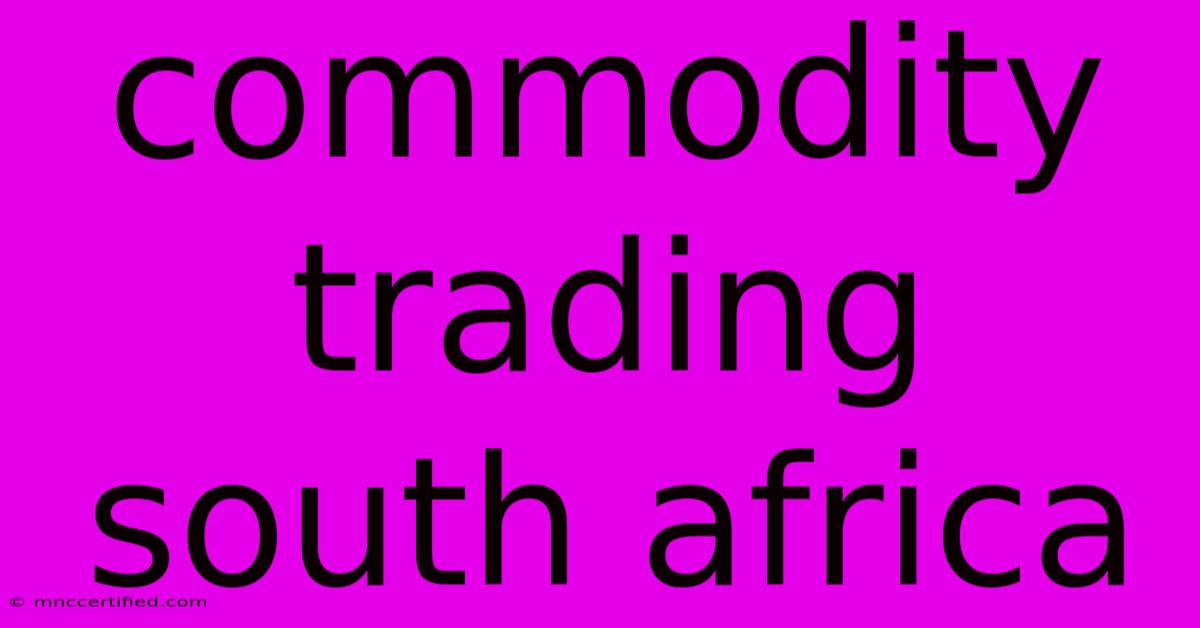Commodity Trading South Africa

Table of Contents
Commodity Trading in South Africa: A Comprehensive Guide
South Africa, with its rich natural resources and strategic location, presents a dynamic landscape for commodity trading. This comprehensive guide explores the intricacies of commodity trading within the South African context, covering everything from market dynamics and regulatory frameworks to potential opportunities and associated risks.
Understanding the South African Commodity Market
South Africa's commodity market is heavily influenced by its robust mining sector, which plays a significant role in the global supply chain of various commodities. Key commodities traded include:
- Precious Metals: Gold, platinum, palladium, and others form the backbone of South Africa's commodity exports and trading activities. The country is a major global producer of these metals, making it a pivotal player in the international precious metals markets.
- Base Metals: While less dominant than precious metals, base metals like iron ore, manganese, and chrome also contribute significantly to the South African economy and trading volumes.
- Agricultural Commodities: South Africa's diverse climate allows for the production of various agricultural commodities, including maize, wheat, sugar, and fruits, all of which are actively traded domestically and internationally.
- Energy Commodities: Coal, and increasingly renewable energy sources, are also important commodities traded within South Africa.
Understanding the supply and demand dynamics of these commodities is crucial for successful trading. Factors like global economic growth, industrial activity, and weather patterns significantly influence commodity prices and trading opportunities.
Regulatory Landscape and Market Participants
The South African commodity market is overseen by several regulatory bodies, including the Financial Sector Conduct Authority (FSCA) and the JSE (Johannesburg Stock Exchange). These bodies ensure fair practices, transparency, and investor protection within the market.
Key participants in the South African commodity trading market include:
- Mining Companies: Large-scale mining operations are primary producers and suppliers of many commodities.
- Trading Houses: These companies facilitate the buying and selling of commodities on a global scale.
- Financial Institutions: Banks and other financial institutions provide financing and risk management solutions for commodity traders.
- Individual Investors: Sophisticated investors participate directly through futures and options contracts.
Navigating this complex regulatory environment requires a thorough understanding of the relevant laws and regulations. Seeking professional financial advice is highly recommended before engaging in commodity trading.
Opportunities and Risks in South African Commodity Trading
Commodity trading in South Africa offers significant opportunities, particularly for those with a strong understanding of market trends and risk management. However, it's crucial to acknowledge the inherent risks:
Opportunities:
- High Volatility: Price fluctuations in commodity markets can create lucrative trading opportunities for skilled traders.
- Diversification: Commodities can offer diversification benefits to investment portfolios.
- Global Demand: South Africa’s commodities are in demand globally, offering access to vast markets.
Risks:
- Price Volatility: The same volatility that creates opportunities can also lead to significant losses.
- Geopolitical Factors: Global events and political instability can dramatically impact commodity prices.
- Market Manipulation: The potential for market manipulation exists, although regulations aim to mitigate this risk.
- Regulatory Changes: Changes in regulations can impact trading strategies and profitability.
Getting Started with Commodity Trading in South Africa
Beginners interested in commodity trading in South Africa should consider the following:
- Education: Thorough research and education are vital. Understand fundamental and technical analysis, risk management, and trading strategies.
- Broker Selection: Choosing a reputable and regulated broker is crucial. Compare fees, platforms, and services before committing.
- Risk Management: Develop a robust risk management plan to protect your capital. Never invest more than you can afford to lose.
- Start Small: Begin with a small amount of capital to gain experience before scaling up your trading activities.
Conclusion
Commodity trading in South Africa presents both lucrative opportunities and substantial risks. Success requires a thorough understanding of the market dynamics, regulatory framework, and effective risk management strategies. By carefully considering the information presented and seeking professional financial advice, potential traders can navigate this complex landscape and make informed decisions. Remember to always conduct thorough due diligence before entering any trade.

Thank you for visiting our website wich cover about Commodity Trading South Africa. We hope the information provided has been useful to you. Feel free to contact us if you have any questions or need further assistance. See you next time and dont miss to bookmark.
Featured Posts
-
Hunger Games Trading Cards Box
Nov 28, 2024
-
Linus Tech Tips Nas Investment
Nov 28, 2024
-
Volcano Bees Belgian On Celtic
Nov 28, 2024
-
Trading Post In Salt Lake City
Nov 28, 2024
-
South Africa Trails At 79 4
Nov 28, 2024